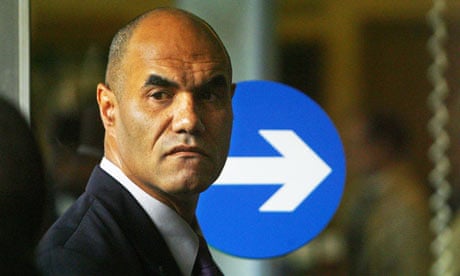I don't think I'm the only one gawping in disbelief at yesterday's acquittal of Delroy Smellie, a sergeant in the Territorial Support Group of the Metropolitan Police. He was accused of assault after hitting Nicola Fisher at a protest in London on 2 April last year. She had gathered with others to commemorate Ian Tomlinson, who had died after being pushed over by police at the G20 protests the day before. Sgt Smellie hit Fisher across the face with the back of his hand, then twice on her legs with his baton, knocking her to the ground.
The judge, Daphne Wickham, said, "It was for the prosecution to prove this defendant was not acting in lawful self-defence. I have found the prosecution has failed in this respect and the defendant has raised the issue of lawful self-defence and as such is entitled to be acquitted." There was no jury.
In other words, Smellie was acquitted on the grounds that he was acting in self-defence. All I have to go on is the video evidence, but, having watched it several times, I find this verdict amazing.
Smellie argued that he had mistaken the drinks carton in Nicola Fisher's hand for a weapon. I wasn't in court to hear all the evidence, but however many times I watch the incident, I cannot see how he formed that impression. When he hit her on the legs, she was holding the carton at arm's length, far away from him, while using the same hand to point to something away to her right. The carton was clearly in view, and she was wasn't making any threatening gesture with it.
Smellie said: "At the time, I thought, 'This is it. She is deliberately coming from a blind spot. The reason she is coming from a blind spot is to hide her intention so she can approach and attack her target – me.'"
But when he hit her on the legs, she wasn't coming from anywhere. She was standing still and pointing. And the idea that this huge, well-armed man could have felt, as he claimed, threatened by that tiny woman seems laughable to me. It certainly isn't the impression the footage creates. He very calmly, almost casually, draws his baton and knocks her down, then immediately switches his attention to someone else.
Perhaps the prosecution put together a lousy case (it can't have helped that Fisher wouldn't testify), or perhaps the judge is right to maintain there was "no evidence that his use of the baton was not approved, correct or measured", though if that's true it suggests there's something gravely wrong with the Met's procedures. As I argued in my column this week, the force's handling of protests is abysmal. In this case, the aggro to which Smellie was responding was manufactured by the Met's decision to kettle (encircle) the demonstrators, transforming a peaceful vigil into a tense encounter.
But the obvious question is: where the hell was the jury? The courts and prosecutors are renowned for their lenient treatment of police officers. The need for a jury trial in these cases is even more pressing than in others. Watch the video and see what you think.
And, to see how differently such charges are prosecuted when the suspect isn't a police officer, check out this case, in which a busker appears to have been assaulted by police, then charged with – and, last week, convicted of – assault. If the account here can be believed, it's a gross miscarriage of justice.

Comments (…)
Sign in or create your Guardian account to join the discussion